
11 March 2010
|

After last month's epic investigation into Bubble Bobble, RG's poor
puffed-out professor of posterity Stuart Campbell needed something a
little simpler to deliver a definitive documentary dissertation on. But
just so he didn't get off too easily, we made him play the hardest
videogame series of all.
THE DEFINITIVE...

In business, the worst thing you can do is get something right first
time. (Look at the GBA and
the DS, for example. How many of you bought the same console twice,
after Nintendo brought out a new version months later with all the
features that should have been there in the first place?) Hit the
nail right on the head with your debut release and you've got
nowhere left to go when it's time to maximise the projected revenue
streams from your brand franchise ("release a sequel", for those of
you who aren't some marketing tosser in desperate need of being
killed). All truly great games are delicately balanced, and can
easily collapse under the weight of gratuitous extra features thrown
in purely for the sake of adding something new to justify selling
you the game again.
Defender is one such
game. One of the most terrifyingly, instantly hard coin-ops ever
created, it has dauntingly complex controls, an unusually large
playing area which needs to be constantly monitored, and savage,
merciless enemies who you'll need every ounce of skill and firepower
at your disposal to stay on top of. Even the few players who have
mastered the game live on a constant knife-edge, where a moment's
lapse in concentration can lead to catastrophe - a planet explosion
early in Defender's five-wave "life cycle" will wreak carnage in the
most diligently-amassed collection of ships and Smart Bombs.
So perhaps more than any
other gaming legend, Defender is a title that's never been improved
on by any of its sequels. (If you make it harder you render it
utterly impossible to 99.8% of players, and if you make it easier
then your core audience won't be interested. And not only is it conceptually incredibly difficult to follow up Defender, the
game's physics and design are so finely tuned that the basic
mechanics of it will be wrecked too if you let anyone even slightly
cack-handed near it.) And if you're not convinced by that assertion,
join us now as we Hyperspace through history to prove it.
| |
|
DEFENDER (arcade)
Despite the
design still being tweaked until almost literally
minutes before the first player put a coin in the slot,
Defender was a huge hit from the word go, its
unprecedented difficulty like a gauntlet slapped across
the face of complacent arcadegoers used to the gentler
challenges of Galaxian or Phoenix.
It was also
widely and swiftly (and generally very competently)
ported to home platforms, from primitive machines like
the Atari VCS (see RG27's interview with author Bob
Polaro), Apple 2 and VIC-20 up to more capable hardware
like the Colecovision and C64.
The few systems that
didn't get official ports saw excellent clones like the
Spectrum's Starblitz and Acornsoft's legendary Planetoid
for the BBC Micro. (There was also an even better
unreleased version of the latter, called "Super
Defender", which surfaced a while ago on the excellent
Stairway To Hell website.)
PLAY IT NOW
ON: There are lots of good ports for various formats,
including the bargain-priced Midway Arcade Treasures
collection for PS2, Xbox and PC, but you still can't
beat MAME's configurable controls for getting as close
to the coin-op experience as human(oid)ly possible.
|
| |
|
|
|
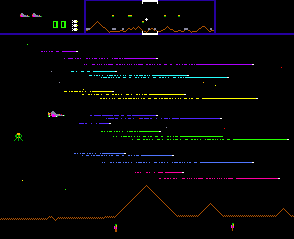 l l
That's very
impressive, but he's behind you, you idiot.
| |
|
STARGATE aka DEFENDER 2 (arcade)
Incredibly,
the game Williams brought out as the follow-up to
Defender was even harder and even more complicated.
Grown men wept openly at the prospect of coping with yet
another control button - this time for the "Inviso"
shield that granted your ship an all-too-brief period of
invulnerability, at the cost of not being able to see
where the hell you were.
Set against this were a whole
raft of ferocious, fast and (worst of all) tiny new
enemies, who'd taken the original game's Swarmers as
their role model but ruthlessly purged all of their
friendlier, kinder aspects (which were pretty hard to
spot in the first place). Designed to mercilessly
destroy even those autistic superhumans who'd mastered
the first game, Stargate is insanely difficult for mere
mortals, and didn't have a fraction of the success of
its parent.
PLAY IT NOW
ON: MAME. Stargate was converted to very few home
platforms at the time, but there was a tremendously good
Atari VCS version, with arcade-like graphics (compared
to the flickery Legoland cityscape of the VCS's first
Defender) and an impressively cunning solution to the
complex-controls problem whereby you could assign
functions to the second joystick and operate Inviso or
Smart Bombs on the floor with your foot.
|
| |
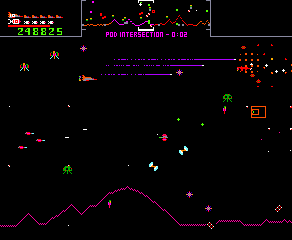 l l
You're in a fairly
substantial amount of trouble already here - on reflection, you
probably didn't want to shoot that Pod and release all those
Swarmers. Oops.
| |
|
DEFENDER 2 (Atari
ST/Amiga)
This
little-known release, published by the short-lived Atari
spinoff Arc and coded by famous hippy developer Jeff
Minter, is something of a pioneer, marking one of the
first ever attempts at updating an arcade classic for
(at the time) modern home formats. It features
(ostensibly) conversions of both original Defender and Stargate in addition to
the new "Defender 2" remake, and unfortunately that's
pretty much where your reporter runs out of good things to say about it.
This is a
gaming atrocity on a spectacular scale - the
"conversions" of the arcade games were crude and jerky
and took a mallet and blunt chisel to the
precisely-poised formula that had made the games such a
hit in the first place, and the update is even worse.
The complex-but-intuitive arcade controls were
arrogantly junked in favour of a hideous, awkward
mouse-and-keyboard combination that apparently left no
room to include the Hyperspace function (rather like
leaving the power pills out of a port of Pac-Man), and
the wildly excessive speed combined with a slideshow framerate (if you ever saw the Max Headroom movie,
you'll recognise the experience of playing Defender 2 as
rather like watching a blipvert) ensured that even if
you could remember which control did what, it still
wouldn't stop you smashing headlong into even the most
innocuous enemy long before you saw them coming.
There
seem to be some quite interesting things happening in
Defender 2 (particularly the various drone ships with
different powers), but it's so horribly badly executed
that you'll
never get to notice any of them.
PLAY IT NOW
ON: The Amiga emulator WinUAE.
|
| |
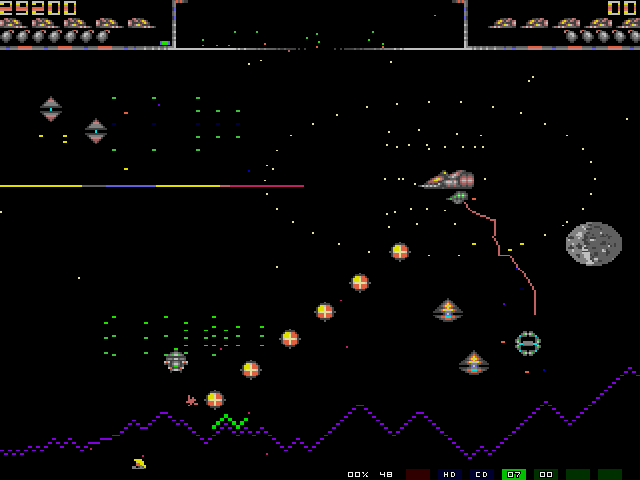 l l
It might look
quite nice in this shot, but for more accuracy imagine playing it
under
a stroboscope while you're absolutely falling-down drunk and the
room's on fire.
| |
|
STRIKE
FORCE: DEFENDER 3 (arcade)
Perhaps even
less well-known than the home version of Defender 2 is
Midway's arcade sequel from three years later, perhaps
because the "Defender 3" part of the name is relegated
to a small-print subtitle on some versions of the title
screen.
(For reasons unknown to science, Midway were
extremely shy of publicising the game's link to the
Defender series, and on the version currently playable
in MAME there are only the tiniest clues, such as the
high-score table entries spelling out "DEF", "END" and
"ER". I'm sure that the revision on the JAMMA board in
my cellar displays "Defender 3" on the screen, but
tragically my Supergun's SCART output seems to be
knackered and I can't check.)
In play it's
unmistakeably part of the family, and enjoys splendid,
detailed graphics and some spectacular pyrotechnics, but
as was the style of the time (this was the era of arcade
remakes like Smash TV) it's been swamped in a billion
extras and powerups and complications which - piled onto
a game as already-overwhelming as Defender - were just
far too much for most players to cope with.
PLAY IT NOW
ON: Strike Force runs well in MAME.
|
| |
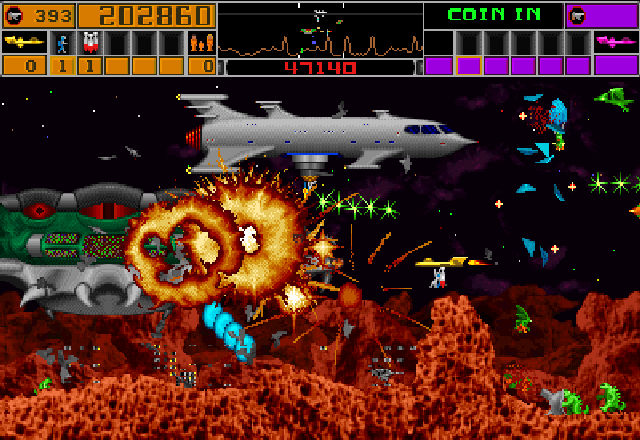 l l
Strike Force -
just another average day saving the universe from evil space
dinosaurs.
| |
|
DEFENDER &
JOUST (Game Boy)
While
theoretically just a conversion of the original, this
one deserves separate inclusion as an example of just
how grossly inaccurate a job it's possible to make of
replicating a simple old game, until it's effectively
something completely different.
Pretty much everything's
been screwed with here - the Mutants are now
terrifyingly savage enemies who can match your speed at
maximum thrust, while the previously-lethal Baiter
becomes a dumb piece of cannon fodder that flies slowly
in a straight line right into your laser blasts, on the
incredibly rare occasions it can be bothered to show up at all.
The
planet's been shrunk, there are only half-a-dozen
Humanoids occupying it instead of 10, the scoring is
wrong, there's music (thankfully optional), Pods and Swarmers don't appear until several screens late, and
the view is so zoomed-in that there's no point looking
at the main screen at all, as unless you play by the
scanner you'll have no time to react to anything
dangerous that appears.
Since the
game's comically easy unless you let any Mutants show up
(at which point it's nearly impossible), the only
sensible strategy is to callously murder all but one of
your unfortunate Humanoids straight away, then sit and
wait by the other one (or rescue him then carry him
around), turkey-shooting the hapless Landers as they
ponderously trundle along towards it. Which, y'know,
kinda undermines the point of the game being called
"Defender", a bit.
(For pocket defend-o-fun,
incidentally, a vastly better port was released for the
Game Boy Color in 1998 under the confusingly-reversed
title "Joust & Defender". There's also a PSP version on
Midway Treasures, but it's pretty unplayable.)
PLAY IT NOW
ON: Visual Boy Advance.
|
| |
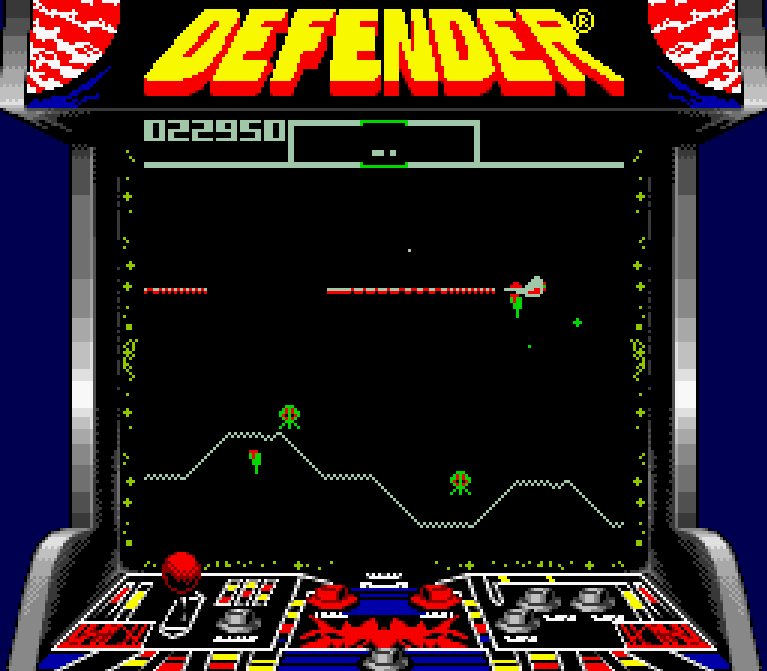 x x
Pretty much the game's only
good feature is that it supports the Super Game
Boy adapter, with colour graphics and this quite nice screen
surround.
| |
|
DEFENDER 2000
(Jaguar)
After his
stellar success with the magnificent Tempest 2000, Atari
perhaps thought Jeff Minter had finally nailed the
updating-classic-coin-ops routine, so they gave him a
second stab at Defender.
It was a decision that turned
out to be on a par with asking Gary Glitter and Jonathan
King round to babysit while you went on a six-month
backpacking holiday, and when you additionally threw in
Atari's own constant interference with the project (like
switching its planned format between a graphics-heavy CD
game and a more restrained cartridge one), you might as
well just have left the cocaine cupboard unlocked at the
same time and been done with it.
Creating a
remake of Defender that was worse than Defender 2 should
have been an impossible task, but with Herculean effort
the Jag version just about pulled it off, largely due to
zooming in the view and thereby introducing the
stupidest feature that anyone could ever have imagined
putting in a game where the most vital objects are on
the ground - vertical scrolling.
Luckily, in
the "Defender 2000" game (the cart also came with a sort
of My First Defender port of the original for kids, and
a half-decent tweaked version called Defender Plus) your
gigantic, clumsy, inertia-heavy craft was so absurdly
over-powered that even when you couldn't see where you
were going or what you were shooting at (ie
pretty much all the time), your autofiring,
auto-targeting drone ship ensured that it didn't really
matter - if you just kept flying and trying not to crash
into stuff, the game would largely play itself.
Coupled with
tacky, eye-watering graphics (psychedelically garish in
Defender Plus, miserably dark and gloomy in Defender
2000) and the same ludicrously over-the-top speed that
ruined Defender 2, the overall effect was like throwing
up on a waltzer at Barbara Cartland's house in a power
cut during a thunderstorm. (On LSD, obviously). Just
terrible.
PLAY IT NOW
ON: Defender 2000 is just about playable (at least,
as playable as it gets) in Virtual Jaguar,
albeit painfully slowly. The wise choice is to take the
hint.
|
| |
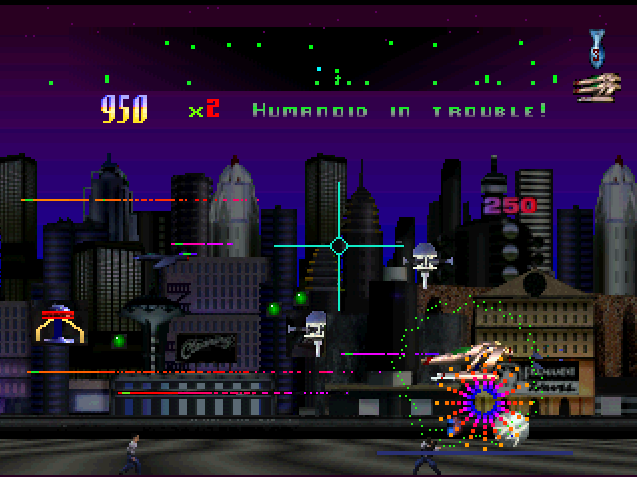 l l
Get a load of
your big fat monster-ship. (Hey, I wonder if that's what Jabba The
Hutt's
minions called him? "Here's your enormous bucket of cakes, your big
fat monster-ship.")
XXXXXXXXXXXXXXXXXXXXXXXXXXXXXXXXXXXXXXXXXXXXXXXXXXXXXXXXXXXXXXXXXXXXXXXXXXXXXXXXX
| |
|
DEFENDER
(Game Boy Advance)
Poor old
Defender. There's so much going on in this release, and
it's all so stupendously awful, that it defies
comprehensive explanation in this limited space. There
are three main game modes, of which the least atrocious
is "Classic", a fairly straightforward port that's only
really ruined by the diabolical control, which is at
once treacle-slow and over-sensitively twitchy
(depending largely on which axis you're moving in).
Then there's
"Defender XP", ostensibly the classic game with updated
graphics, but which actually uses a confusingly
different control method, with the d-pad effecting
normal directional movement rather than the traditional
thrust-and-reverse (executed with the shoulder buttons)
of the classic mode.
Worst of
all, though, is the default main game, "Defender XGP",
which is simply an utter mess. Massive graphics that
resemble the aftermath of sneezing on your GBA reduce
manoeuvring space to a minimum, five selectable ships
overcomplicate matters pointlessly, and the gameplay is
diluted with all sorts of incomprehensible
"defending"-related missions and subgames. It's nothing
like Defender, and it's even less like a good videogame.
PLAY IT NOW
ON: Visual Boy Advance.
|
| |
 l l
You (the
droopy beige thing) are ostensibly escorting/defending that big grey
ship,
but it seems to explode and rematerialise at random regardless of
what you do.
| |
|
DEFENDER
(PS2, Xbox, Gamecube)
Strangely,
though, at more or less the same time as the GBA
atrocity Midway also released a modern updating of
Defender that brought it unmistakeably into the 3D age
while still retaining the core values and atmosphere of
the original. Evidently somewhat modelled on the
successful Gamecube title Rogue Squadron, the 2003
Defender actually does away with almost every
identifiable feature of the 1980 game, but nevertheless
captures an appreciable amount of its frantic,
against-the-odds feel as you scoot around various
deep-space outposts protecting them from a ferocious
alien onslaught.
Slightly optimistic sales forecasts at
the time mean that the PS2, Xbox and Gamecube versions
are all fixtures in the £5-or-less bargain bins of most
game stores, and while it's not brilliant, it's
well worth picking up at that price.
PLAY IT NOW
ON: Your PS2, Xbox or Gamecube, obviously.
|
| |
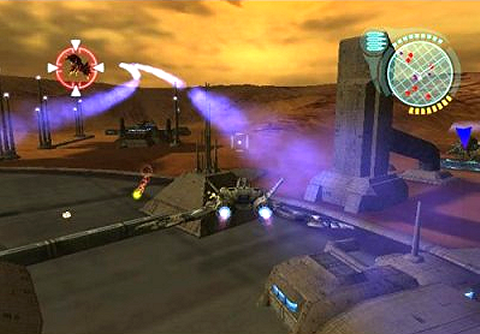 l l
The graphics
help to contribute to an authentically menacing ambience.
| |
|
DEFENDER
(mobile phone)
Normal
service, however, was resumed in 2005's port to mobile phones.
You might well think that trying to adapt a game like
Defender onto a mobile phone's tiny screen and keypad
was one of the stupidest ideas anyone's ever had, and
this mangled version with its gigantic graphics and
microscopic screen area would confirm your suspicions.
Still, maybe someone'll get it right on the Wii, eh?
PLAY IT NOW
ON: Some sort of mission of self-punishment.
|
| |
 l l
The new graphic style is
rather pretty, but unfortunately makes the game
even more unplayable by taking away all your manoeuvring space.
| |
|
DEFENDER
(Xbox 360)
...or the
360, as it happens. Xbox Live Arcade was made for games
like Defender, and in common with their other XBLA
conversions Midway made a thoughtful and professional
job of it. You can play with original graphics or some
tasteful new ones, and a variety of control options make
this probably the friendliest official Defender to play
ever made. That's not to say it's any easier as such -
the savage difficulty level is as uncompromising as ever
- but at least now you're just battling the ferocious
enemies, and not the controls too.
PLAY IT
NOW ON: Your Xbox 360, assuming you've already
bought it - Midway's XBLA titles were all pulled from
the service in early 2010 "due to evolving rights and
permissions", according to a Microsoft spokesman.
|
| |
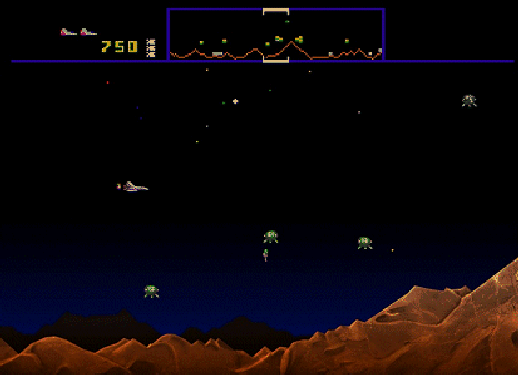 l l
As you can
plainly tell from this screenshot, XBLA Defender offers both the
classic thrust-and-reverse
control scheme, and a modern alternative with direct d-pad/analogue
stick directional movement.
STRIKE FORCE 2 DEFENDER 4 (aet)
Incidentally, there's actually a great game trapped somewhere inside 1991's Strike Force, struggling to fight its
way out from beneath the overcomplicated Starship-Troopers-in-a-watermelon-shop
mayhem, and that game's name is Overkill.
An unoffical clone created
for the Amiga 1200 in 1993 by New Zealand-based coders Vision (who'd
previously made an almost-arcade-perfect public-domain port of
Defender in Blitz Basic for the vanilla Amiga which was a hundred
times better than the official Arc release), Overkill looked very
much like its inspiration but successfully toned down the coin-op's
worst excesses and produced something far more coherent and
accessible, and which might in fact ultimately be the best Defender game ever.
(You can see for yourself with Amiga emulator WinUAE.)
There's probably some irony
in there, but sadly we've run out of room before we could look for
it properly. See you next time!
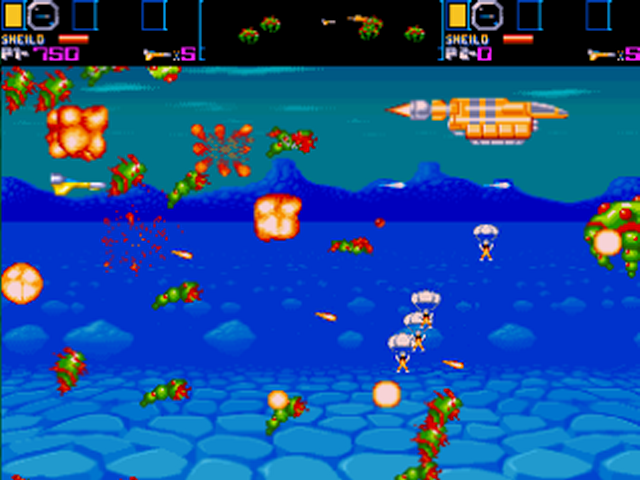
So unofficial,
they even spelt "shield" differently.
|